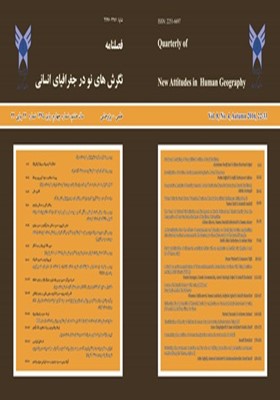سیاست آب در حوضۀ آبریز کارون بزرگ و چالشهای هیدروپلیتیکی ناشی از آن
محورهای موضوعی : کالبدییـاشار ذکی 1 , مصطفی رشیدی 2 *
1 - استادیار جغرافیای سیاسی، دانشگاه تهران، تهران، ایران
2 - دکترای جغرافیای سیاسی، دانشگاه تهران، تهران، ایران
کلید واژه:
چکیده مقاله :
چکیده آب به عنوان یک مادۀ رقابتی بسیار مهم در سطح بینالمللی، منطقهای، ملّی، ناحیه ای و محلّی است و بر این اساس مدیریّت منابع آب، رقابت شدیدی را برای سلطه و نظارت بر منابع آبی ایجاد کرده است، که از آن به ژئوپلیتیک آب و یا هیدروپلیتیک تعبیر می شود. توزیع ناهمگون مکانی و زمانی بارش، کمبود ریزشهای جوّی، عدم تناسب میان عرضه و تقاضای آب در برخی نواحی کشور، کاهش تدریجی منابع آب بویژه بر اثر برداشت بی رویه از آب های سطحی و زیرزمینی و تغییرات آب و هوایی در کنار رشد بالای جمعیّت بویژه در برخی نواحی کشور از یک سو و انتقال آب از نواحی دارای توان هیدرولوژیکی نسبتاً خوب به سایر مکان های دارای کمبود آب از سوی دیگر سبب میشود که رقابت های شدید و منفی بر سر تصاحب منابع آب صورت گیرد. این امر در نهایت زمینۀ تنش میان گروهها، مراکز جمعیّتی و فضاهای سکونتگاهی را با یکدیگر فراهم می نماید. امری که از منظر ژئوپلیتیک منجر به صورت بندی هیدروپلیتیک منفی در مقیاس ملّی و ناحیه ای می گردد. مقالۀ حاضر با روش تحقیق تحلیلی ـ توصیفی و با هدف شناسایی و تبیین اثرات مدیریت غیرآمایشی و غیرمنطبق بر توان سرزمینی در حوزه منابع آب و بویژه مسئله انتقال بین حوضه ای آب از حوضۀ آبریز کارون بزرگ (بهشت آباد) به داخل فلات مرکزی ایران در بروز منازعات و واگرایی های محلّی انجام گرفته است.
References
Agricultural Jihad Organization of Chaharmahal & Bakhtiari Province (2003). Document Agricultural Development and Natural Resources Chahar Mahal & Bakhtiari, Ministry of Agriculture.
Arab, D.R & Mohammad Vali Samani, J (2008). The Report of Beheshtabad Inter-Basin Water Transfer to the Central Plateau, Office of Majlis Research Center Infrastructure. Serial number 8935 Report.
Boroujeni Samadi, H (without date). Beheshtabad tunnel, source of conflicts and social crises in the future, Available in: http://waterresources.blogfa.com/page/m.
Dolatyar, M & Gary, T (2010). Water Politics in Middel East, Translate by R. Afzali & R. Eltiaminia, Tehran: International Press.
Dugin, A (2003). Avrasiyaci Ҫağri ve Türkiyenin Yeri, Available in: http:// Parsimony. Net / Forum 67363 / messages / 1527. Htm.
Ezzati, E (2005). Analysis of the Geopolitics of Iran and Iraq, Tehran: Ministry of Foreign Affairs.
Gönbübol, M (1978). Uluslararasi Politika İlkelar-Kavramlar, Ankara: Ankara Üniversitesi Basimevi.
Hafeznia, M.R & Kavianirad, M (2014). Philosophy of Political Geography, Tehran: Publishing Institute for Strategic Studies.
Hafeznia, M.R & Nikbakht, Mehdi (2002). Water and socio-political tensions, Case Study: Yes. Mashhad. Geographical Research Quarterly, No. 65-66.
Hafeznia, M.R (2006). Principles and Concepts of Geopolitics, Papoli Press.
http://isfahan.ir/Dorsapax/userfiles/Image/moavenat%20khadamatshahri/ZA2.jpg
İlhan, S (2003). Jeopolitik duyarlılık, Ötüken Yayınları, İstanbul.
Khodabakhshi, B & Khodabakhshi, F (2006). Inter-basin water transfer, sustainable approach to water resources management, Isfahan Conference on Water Resources Management.
Lacoste, I & Giblen, B (1999). Geopolitical Factors and Ideas, Translated by A. Ferasati, Tehran. Publishing secure.
Mojtahidzadeh, P (2002). Geopolitical and Geographical Policy, Tehran: SAMT Press.
Moro Dhofar, P (2013). Geopolitical Culture. Translate by S.H Raziei. Tehran: Publication of Contemporary Culture.
Mottaghi, A, Rashidi M & Ghamari, A (2013), Geographical Analysis of Khuzestan Citizens Vote in Presidential Elections, Geography Quarterly (Regional Planning), No.4, Fall.
Naji, S (2005). An Analysis of the Geopolitics of the Middle East at Large, Tehran: Goharshad Publications.
Papoliyazdi, M.H & Vosoughi. F (2011). Take a Water Diplomacy in Iran: Hydro geopolitics, Mashhad: Papoli Press.
Rahmani, B (1995). Glossary of Choice, Physical and Human Geography, Tehran: Alavi Publications.
Rahnemaei, M.T (2010). Environmental Abilities, Tehran: Wisdom and Power Press.
Rashidi, M (1393), Pathology Geopolitical Approach to Land Use Planning in Iranian Territorial Space and Provide Strategic Model, Doctoral Dissertation, Faculty of Geography, University of Tehran.
Saeednia, M, Samadi Boroujeni, H. & Fatah, R (2008). Evaluation of Inter-basin Water Transfer Projects by Using WEAP (Case Study: Tunnel Beheshtabad), Iran Water Research magazine, No. 34 33.
Samadi Boroujeni, H (2013). Presidential Candidates Promise not Water Transfer Tunnel, Available in: http://ibnanews.ir/vdcc.mqma2bqesla82.html.
The Government Cabinet of the Islamic Republic of Iran (2003). Approval of Long-Term Strategies of Country Water Resources Development.
Yilmaz, T & Nurat T.M (2002). Dünden Bu Güne Jeopolitik, İstanbul:Ülke Kitablari.
Zaki, Y (2012). Geopolitical Foundations of Effective on the Nation-State Divergence of the Islamic World (with an Emphasis on Geographic Values). Tabriz. The Fifth Congress of the Islamic World Geographers.
Zarghami, M & Charity, F (2011). A Multi-Criteria Decision-Making Methods of Evaluation in Water Transfer Projects in the Basin of Urmia Lake, Iran Water Resources Research. No. 20.

